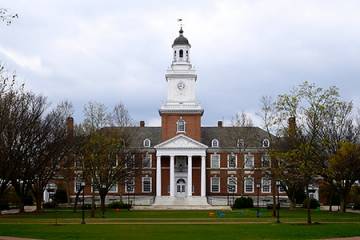Nearly 300 Johns Hopkins University students applied to join a committee that will help develop guidelines for the gradual resumption of academics and other on-campus activities, part of the university's broad, collaborative approach to navigating the ongoing challenges of the COVID-19 pandemic.
The JHU 2020 Planning Student Advisory Committee will provide critical input and guidance as Johns Hopkins maps out a multiphased resumption of suspended in-person educational, clinical, research, and other activities, ensuring that student voices and perspectives inform the process.
Students selected to the committee—20 graduate and undergraduate students representing all nine JHU academic divisions—were notified on Sunday, and the committee roster was announced today.
"Students are at the heart of the university mission—they are key stakeholders," said Janet Schreck, associate vice provost for education, who will co-chair the committee along with Alanna Shanahan, vice provost for student affairs. "It's critical that we seek their input and incorporate it in our decision-making process."
All but essential in-person activities have been suspended on JHU's campuses since mid-March amid the coronavirus pandemic, with most instruction and employee activity taking place remotely. Last week, JHU President Ronald J. Daniels and Provost Sunil Kumar outlined a phased approach to resuming university activities, with specific timelines dependent both on the easing of local, state, and federal restrictions and JHU's own continuous assessment of public health data and conditions on its campuses.
The university recently convened a planning task force that includes workgroups to examine questions and issues related to research; undergraduate and graduate academic programs; student life, including campus residential life; and health and safety. Another set of workgroups is focused on broad operational issues, including safe use of university facilities and bringing employees back to campus.
The workgroups are charged with evaluating and documenting options and recommendations on the multiphased return to in-person activities—addressing issues in their respective areas—that will be shared with deans, faculty governance bodies, and university leaders. All told, those workgroups include more than 285 faculty members, staff, and students.
The new student advisory committee, which is separate from these workgroups, will meet virtually twice a week through June, beginning this week, and twice a month (or as necessary) in July and August. Information about the committee's ongoing activities will be available on the JHU 2020 Planning website.
"The members of this committee will be asked to look holistically at all that Hopkins must manage as we look to resume activities," Shanahan said. "We already have students involved in specific workgroups, and this group of students will be given the opportunity to view and improve upon the planning process comprehensively, and with great sensitivity to the student experience."
Input and engagement from across the Hopkins community is encouraged throughout the planning process. Comments and suggestions about the resumption of activities can be shared at any time via a feedback form on the JHU 2020 Planning website, as well as at virtual town hall events that will be scheduled and announced in the coming weeks.
The members of the Student Advisory Committee are:
- Kai Abiola, junior, Krieger School of Arts and Sciences
- Layan Atieh, junior, Krieger School of Arts and Sciences and Peabody Institute
- Vanessa Battista, third-year graduate student, Carey Business School and School of Nursing
- Zachary Britt, second-year graduate student, Bloomberg School of Public Health and Carey Business School
- Mia Grahn, sophomore, Whiting School of Engineering
- Christopher Hartung, second-year graduate student, Peabody Institute
- Marissa McDonald, junior, Whiting School of Engineering
- Harvey McGuinness, first-year undergraduate student, Krieger School of Arts and Sciences
- Sam Mollin, junior, Krieger School of Arts and Sciences
- Harry Paul, doctoral student, School of Medicine
- Benjamin Peak, doctoral student, Krieger School of Arts and Sciences
- Shiselle Povedano, second-year graduate student, School of Advanced International Studies
- Robert Scala, junior, Krieger School of Arts and Sciences
- Caroline Siebald, doctoral student, School of Medicine
- Lanise Stevenson, doctoral student, School of Education
- Kate Sully, second-year graduate student, Carey Business School
- Eugenia Volkova, doctoral student, Whiting School of Engineering
- JiWon Woo, sophomore, Whiting School of Engineering
- Etan Yeshua, second-year graduate student, School of Nursing
- Yuehan Zhang, doctoral student, Bloomberg School of Public Health
Posted in University News, Student Life








